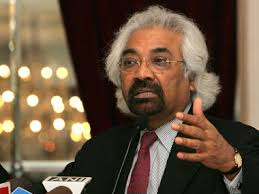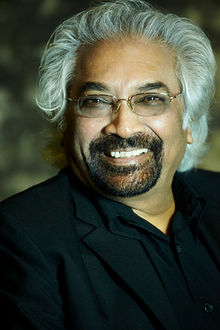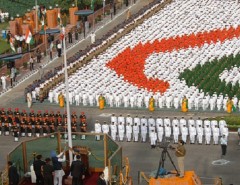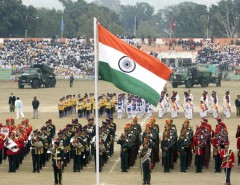 Satyanarayan Gangaram Pitroda popularly known as Sam Pitroda (born 4 May 1942) is a telecom engineer, inventor, entrepreneur and policymaker. He was born in Titilagarh, Odisha, India. In 1964, he traveled to Chicago to study electrical engineering.
Satyanarayan Gangaram Pitroda popularly known as Sam Pitroda (born 4 May 1942) is a telecom engineer, inventor, entrepreneur and policymaker. He was born in Titilagarh, Odisha, India. In 1964, he traveled to Chicago to study electrical engineering.
After many years Pitroda visited India and could not make a phone call to his wife. So he returned to India and spent nearly a decade with Prime Minister Rajiv Gandhi as leader of an effort to build an Indian information industry. The task was to extend digital telecommunications to every corner of the country, including remote villages, like the one of his birth. Pitroda launched the Center for the Development of Telematics (C-DOT), and served as Advisor to the Prime Minister on Technology Missions related to water, literacy, immunization, oil seeds, telecom, and dairy. He is also the founding Chairman of India’s Telecom Commission. Pitroda returned to India a second time in 2004 to focus on building knowledge institutions and infrastructure. Pitroda served as chairman of the National Knowledge Commission (2005–2009), a high-level advisory body to the Prime Minister of India, to give policy recommendations for improving knowledge related institutions and infrastructure in the country. During its term, the National Knowledge Commission submitted around 300 recommendations on 27 focus areas.
Pitroda also founded the National Innovation Council (2010), and served as the Advisor to the Prime Minister with rank of a cabinet minister on Public Information Infrastructure and Innovation, to help democratize information. Pitroda founded and served as Chairman of C-SAM. The company maintains its headquarters in Chicago with offices in Singapore, Tokyo, Pune, Mumbai and Vadodara. Pitroda holds around 100 technology patents, has been involved in several start-ups and lectures extensively. Pitroda has also started several businesses as a serial entrepreneur (Wescom Switching, Ionics, MTI, Martek, WorldTel, C-SAM, etc.) in the US and Europe. He has also served as an advisor to the United Nations and in 1992, his biography Sam Pitroda: A Biography was published and became a bestseller on The Economic Times list for five weeks.
Many argue that, as technology Advisor to the Prime Minister, Rajiv Gandhi in 1984, Pitroda both heralded the telecom revolution in India, and made a strong case for using technology for the benefit of society through missions on telecommunications, literacy, dairy, water, immunization and oil seeds[citation needed]. The claim that Pitroda played a major role in ushering in the Telecom Revolution in India has been disputed in an article by Rajeev Mantri and Harsh Gupta published by LiveMint. He has lived in Chicago, Illinois since 1964 with his wife and two children and also in Delhi.
Early life
Satyanarayan Gangaram Pitroda was born in Titlagarh, Odisha, India, to parents from Gujarat. He had seven siblings and is third oldest among them. The family was deeply influenced by Mahatma Gandhi and his philosophy. Consequently, Pitroda and his brother were sent to Gujarat to imbibe Gandhian philosophy. He completed his schooling from Vallabh Vidyanagar in Gujarat and completed his master’s degree in Physics and Electronics from Maharaja Sayajirao University in Vadodara. After completing his Masters in Physics he went to the United States and obtained a Masters in Electrical Engineering from the Illinois Institute of Technology in Chicago.
Career
Early career
Throughout the late 1960s and early 1970s Pitroda was involved in technology research work in telecommunications and hand-held computing. In 1966 he went to work for GTE in Chicago. He is regarded as one of the earliest pioneers of hand-held computing because of his invention of the Electronic Diary in 1975.
In 1974, Pitroda joined Wescom Switching which was one of the first digital switching companies. He developed the 580 DSS switch, over nearly four years. It was released in 1978. Wescom was acquired by Rockwell International in 1980, where Pitroda became vice president. During his four decades as an engineer, Pitroda filed scores of patents in telecommunications. The latest set of patents relate to mobile phone based transaction technology, both financial and non-financial, via mobile phones.
Return to India
On a 1981 trip back to India, he was frustrated by how hard it was to call his family back in Chicago, and decided he could help modernize India’s telecommunications system. In 1984, Pitroda was invited to return to India by the Prime Minister Indira Gandhi. On his return, he started the Center for Development of Telematics C-DOT, an autonomous telecom R&D organization. He had previously become a naturalized US citizen, but renounced his US citizenship to take Indian citizenship again in order to work in the Indian Government. In 1987, he became advisor to Indira Gandhi’s successor, Rajiv Gandhi and was responsible for shaping India’s foreign and domestic telecommunications policies.
In 1987 during his tenure as advisor to Prime Minister Rajiv Gandhi, Pitroda headed six technology missions related to telecommunications, water, literacy, immunization, dairy and oil seeds. He founded and was first chairman, of India’s Telecom Commission.
Pitroda contributed to India’s foreign and domestic telecommunications policies. He is considered one among many to be responsible for the telecommunication revolution in India and specifically, the ubiquitous, yellow-signed public call offices (PCO) that quickly brought cheap and easy domestic and international public telephones all over the country. In the 1990s Pitroda returned to Chicago to resume his business interests. In May 1995, he became the first chairman of WorldTel initiative of the International Telecommunication Union.
When the United Progressive Alliance government came to power following the 2004 General Elections, Prime Minister Manmohan Singh invited him to head the National Knowledge Commission of India. In July 2009, the Government of India invited Pitroda to head an expert committee on ICT in Railways. In October 2009, Pitroda was appointed as advisor to PM ofIndia Manmohan Singh on Public Information Infrastructure and Innovations with the rank of Cabinet Minister. In August 2010, Pitroda was appointed Chairman of National Innovation Council.
Awards
- Lal Bahadur Shastri National Award for Excellence in Public Administration and Management Services, 2000, in recognition of his outstanding contribution to telecommunication and harnessing it for social and economic transformation of developing countries
- Dataquest gave Pitroda a lifetime achievement award in 2002. In 2008, Pitroda was elected as a world prominent leader by the World Network of Young Leaders and Entrepreneurs. International Telecommunication Union (ITU) conferred the World Telecommunication and Information Society Award to Pitroda in Geneva on 17 May 2011. He was awarded in recognition of his dedication to promoting Information, communication and technology as a means of providing a better life for humanity and social and economic empowerment. He was the first Indian to receive this award. In May 2010, the University of Illinois at Chicago college of medicine presented him an honorary degreeSambalpur University honored Pitroda with D.Sc. on its 23rd convocation on 14 July 2010.
- The Government of India awarded him the Padma Bhushan in 2009 for his contribution to Science and Engineering. The Skoch Challenger Lifetime Achievement Award in 2009 for ushering in the telecom and IT revolution in India.
- Andhra University honored Pitroda with D.Sc in 2008.
- Award for Public Service in the Field of Telecommunications, IEEE Communications Society, 2007, for exceptional contributions in developing indigenous systems and telecommunications infrastructure in India
- He was felicitated on 31 March 2009 by Akhila Bharatiya Viswakarma Mahasabha (ABVM) for service to the Viswakarma community, in the presence of Chief Minister of Delhi, Smt. Shiela Dixit.
- World Telecommunication and Information Society Award, International Telecommunication Union (ITU), 2011, for his outstanding contribution to improving life in rural communities through information and communication technologies. Sam Pitroda is the first Indian to receive this prestigious award
- He addressed the 2nd Indian Student Parliament in 2012.
Non-profit Organizations (NGOs)
Sam Pitroda currently chairs five major NGOs.
Institute of Trans-Disciplinary Health Sciences and Technology
The first is the Foundation for Revitalization of Local Health Traditions founded in 1990 with Darshan Shankar. It has now turned into the Institute of Trans-Disciplinary Health Sciences and Technology near Bangalore in India. The foundation promotes Ayurveda, India’s traditional medicinal knowledge. Today, FRLHT has over 200 scientists and professionals on 19-acres campus and has documented over 7,000 herbal medicinal plants. It also has over 100 herbal medicine gardens, approximately 500 acres each. Sam Pitroda is chairman, board of trustees at the institute.
The Global Knowledge Initiative (GKI)
In 2009, Sam Pitroda founded The Global Knowledge Initiative (GKI) along with Nina Fedoroff and Sara Farley in Washington, DC as a non-profit organization with a mission to forge, optimize, and sustain knowledge partnerships between the people and institutions of higher education and research around the world. They build and support purpose-driven networks to solve shared challenges in science, technology, and innovation. They have worked in countries including Rwanda, Tanzania, Ethiopia, Kenya, Uganda, Pakistan, Afghanistan, India, Middle East, North Africa and more.
India FoodBanking Network
In 2010, Pitroda established the India Food Banking Network (IFBN) to create a network of Food Banks in India to systematically capture and distribute food to empower and support the food security mission in India. Today, IFBN has food banks in Delhi, Gurgaon, and Noida with plans to expand into Mumbai, Bangalore, Calcutta, and others. Sam Pitroda is chairman of the advisory board of the India FoodBanking Network.
People for Global Transformation
People for Global Transformation was launched in 2012 along with Mr. Hubert Vedrine, France’s former Chief of Staff for President Mitterrand. PGT is a global think tank that brings together an interdisciplinary group of 15 leading voices from across the globe to help shape the 21st century’s discourse on development and governance, and provide innovative policy recommendations. The group particularly endeavors to generate greater transversal thinking on the transformational potential of technology and its consequences for all.
Action For India
Also in 2012, Pitroda founded Action For India to help social innovators in India overcome barriers to scale and achieve greater impact at the Bottom of the Economic Pyramid. AFI connects social innovators with impact investors, mentors, technology resources, government contacts and local partners. AFI is headquartered in New Delhi, India and has a chapter in Silicon Valley, California.
Others
In addition to these six NGOs, Sam Pitroda is also:
- Founding commissioner of the UN Broadband Commission
- Chairman of the m-Powering Development Initiative of the ITU in Geneva
- Chairman of the Vikram A. Sarabhai Community Science Centre
- Board Member of the World Wide Web Foundation
- Board Member of the Institute of Design, IIT, Chicago
- Founding partner of the Young Indian Company, India (now the majority owner of National Herald)
- Born – 4 May 1942
- Residence – Chicago, USA
- Nationality – India




